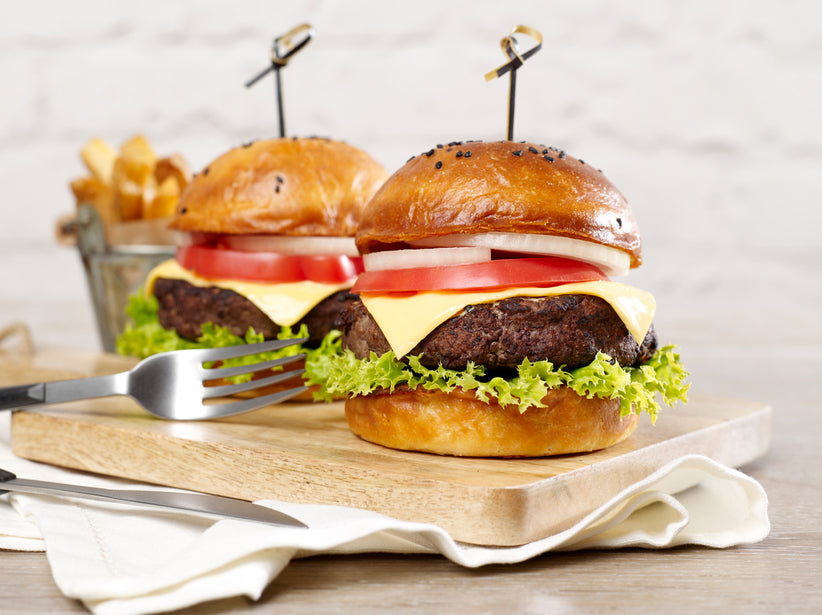
The Truth About Plant-Based 'Meats'
Unpacking the healthy, and not-so-healthy, benefits of meat substitutes
If you are vegetarian, vegan, or are just wanting to eat less meat, you likely have heard of Beyond Meat or the Impossible Burger. These plant-based burgers are gaining popularity and even food chains such as Burger King, Red Robin, and White Castle are including them on their menus. But are these foods really as healthy as they are made out to be? Let’s take a look...
Beyond Meat products get much of their protein content from pea protein. Sounds healthy right? Well, it’s not that simple. In order to create the protein, the peas are processed, and the starch and fiber are removed. The process is similar to the way brown rice is converted to white. When the outer layer of the rice is removed, the body digests the carbohydrates much quicker as the original complex carb is turned into a simple carb. This is why white rice is not as healthy for you. Recently the company has updated their formula to also include proteins from rice and mung beans. This gives more of a complete protein; however, these ingredients are also processed much like the peas which removes some of the nutrition and changes the food from its natural state to a new more processed form.
The Impossible Burger is made with soy protein concentrate and it even has a special ingredient called soy leghemoglobin, which is found in the roots of soybean plants. This is what creates the illusion of “bleeding” like real meat. Soy products are avoided by many due to multiple different health concerns for both men and women that range from digestive issues and hormone disruption to much more concerning health conditions. Not to mention the fact that most soy is GMO and there are just not enough studies on the long-term effects of consuming GMO products. While soybeans have been in the human diet for centuries, this more processed form has caused many to feel uncomfortable with consuming it on a regular basis.
Are these alternative meat products healthier than the real thing? Fat and calorie-wise, they are very similar to a beef burger, and beef doesn’t have any carbs while these products do. So, if you are looking to reduce your waistline by eating them, you might be sorely disappointed. Furthermore, the way that both meat alternatives are produced makes them technically processed foods. And diets higher in processed foods can be linked to numerous diseases. Dietician Amanda Lapidus says that while plant-based burgers can create more variety for those seeking meat alternatives, they should only be used occasionally. “Would I eat it every day? No. Would I eat a burger every day? No, I wouldn’t. This is the same thing,” she says.

As defined by the Heart and Stroke Foundation, ultra-processed foods are those that “go through multiple processes (extrusion, molding, milling, etc.), contain many added ingredients and are highly manipulated.” These include foods such as hot dogs, chicken nuggets, sweetened breakfast cereals, ice cream, chocolate, as well as these types of plant based “meat” products.
Michael Rogers, a food scientist at the University of Guelph in Ontario, Canada is quoted as saying, “We’ve created a whole new form of malnutrition that, from an evolutionary perspective, didn’t exist until a hundred years ago. There is no anthropological evidence to suggest Type 2 diabetes. There’s no anthropological evidence that suggests that diseases like metabolic syndrome even existed a hundred years ago. And that is a direct consequence of the ultra-processing of our foods. These consumers are blindly purchasing foods that they think are healthy because they associate it with a plant. But once that food has been processed, it doesn’t matter if it came from a plant, or a piece of cardboard- the whole food is gone.”
Another thing you should consider when choosing a meat alternative is sodium count. These meat substitutes contain less protein than real meat yet have a significantly larger amount of sodium (as seen here).
This doesn’t mean that all vegetarian burgers are bad. There are plenty of healthier options, like those made from whole foods such as quinoa, brown rice, chickpeas or black beans, for example. Some restaurants like Red Robin even offer these types of vegetarian burgers that would be a much better choice.
At GOLO, we believe that foods closest to their natural state are best for you. Not only are genuine, whole foods healthier but your body knows how to properly digest them. If you are trying to eat more plant-based foods, we suggest that you try a more whole food alternative rather than these processed “meat” products.

Sources:
Source 1
Source 2
Visit GOLO.com to access all the weight loss tools GOLO has to offer!
1-800-730-GOLO(4656) support@golo.com